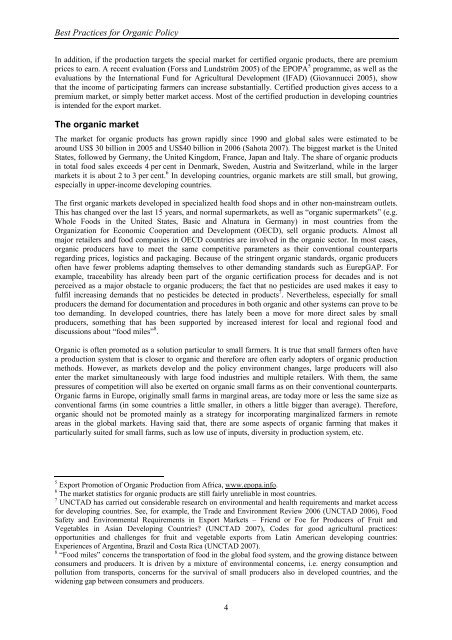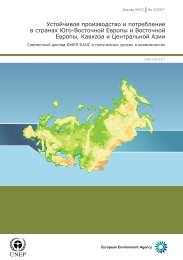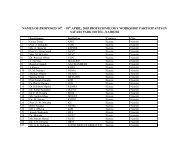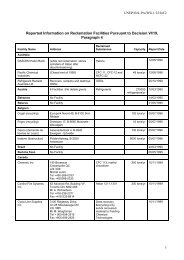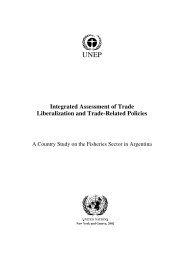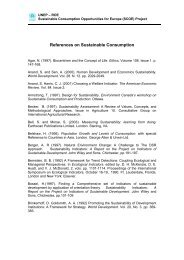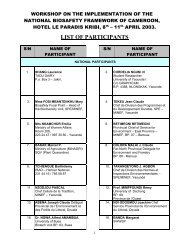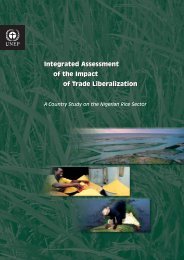Best Practices for Organic Policy - What developing country - UNEP
Best Practices for Organic Policy - What developing country - UNEP
Best Practices for Organic Policy - What developing country - UNEP
Create successful ePaper yourself
Turn your PDF publications into a flip-book with our unique Google optimized e-Paper software.
<strong>Best</strong> <strong>Practices</strong> <strong>for</strong> <strong>Organic</strong> <strong>Policy</strong><br />
In addition, if the production targets the special market <strong>for</strong> certified organic products, there are premium<br />
prices to earn. A recent evaluation (Forss and Lundström 2005) of the EPOPA 5 programme, as well as the<br />
evaluations by the International Fund <strong>for</strong> Agricultural Development (IFAD) (Giovannucci 2005), show<br />
that the income of participating farmers can increase substantially. Certified production gives access to a<br />
premium market, or simply better market access. Most of the certified production in <strong>developing</strong> countries<br />
is intended <strong>for</strong> the export market.<br />
The organic market<br />
The market <strong>for</strong> organic products has grown rapidly since 1990 and global sales were estimated to be<br />
around US$ 30 billion in 2005 and US$40 billion in 2006 (Sahota 2007). The biggest market is the United<br />
States, followed by Germany, the United Kingdom, France, Japan and Italy. The share of organic products<br />
in total food sales exceeds 4 per cent in Denmark, Sweden, Austria and Switzerland, while in the larger<br />
markets it is about 2 to 3 per cent. 6 In <strong>developing</strong> countries, organic markets are still small, but growing,<br />
especially in upper-income <strong>developing</strong> countries.<br />
The first organic markets developed in specialized health food shops and in other non-mainstream outlets.<br />
This has changed over the last 15 years, and normal supermarkets, as well as “organic supermarkets” (e.g.<br />
Whole Foods in the United States, Basic and Alnatura in Germany) in most countries from the<br />
Organization <strong>for</strong> Economic Cooperation and Development (OECD), sell organic products. Almost all<br />
major retailers and food companies in OECD countries are involved in the organic sector. In most cases,<br />
organic producers have to meet the same competitive parameters as their conventional counterparts<br />
regarding prices, logistics and packaging. Because of the stringent organic standards, organic producers<br />
often have fewer problems adapting themselves to other demanding standards such as EurepGAP. For<br />
example, traceability has already been part of the organic certification process <strong>for</strong> decades and is not<br />
perceived as a major obstacle to organic producers; the fact that no pesticides are used makes it easy to<br />
fulfil increasing demands that no pesticides be detected in products 7 . Nevertheless, especially <strong>for</strong> small<br />
producers the demand <strong>for</strong> documentation and procedures in both organic and other systems can prove to be<br />
too demanding. In developed countries, there has lately been a move <strong>for</strong> more direct sales by small<br />
producers, something that has been supported by increased interest <strong>for</strong> local and regional food and<br />
discussions about “food miles” 8 .<br />
<strong>Organic</strong> is often promoted as a solution particular to small farmers. It is true that small farmers often have<br />
a production system that is closer to organic and there<strong>for</strong>e are often early adopters of organic production<br />
methods. However, as markets develop and the policy environment changes, large producers will also<br />
enter the market simultaneously with large food industries and multiple retailers. With them, the same<br />
pressures of competition will also be exerted on organic small farms as on their conventional counterparts.<br />
<strong>Organic</strong> farms in Europe, originally small farms in marginal areas, are today more or less the same size as<br />
conventional farms (in some countries a little smaller, in others a little bigger than average). There<strong>for</strong>e,<br />
organic should not be promoted mainly as a strategy <strong>for</strong> incorporating marginalized farmers in remote<br />
areas in the global markets. Having said that, there are some aspects of organic farming that makes it<br />
particularly suited <strong>for</strong> small farms, such as low use of inputs, diversity in production system, etc.<br />
5 Export Promotion of <strong>Organic</strong> Production from Africa, www.epopa.info.<br />
6 The market statistics <strong>for</strong> organic products are still fairly unreliable in most countries.<br />
7 UNCTAD has carried out considerable research on environmental and health requirements and market access<br />
<strong>for</strong> <strong>developing</strong> countries. See, <strong>for</strong> example, the Trade and Environment Review 2006 (UNCTAD 2006), Food<br />
Safety and Environmental Requirements in Export Markets – Friend or Foe <strong>for</strong> Producers of Fruit and<br />
Vegetables in Asian Developing Countries? (UNCTAD 2007), Codes <strong>for</strong> good agricultural practices:<br />
opportunities and challenges <strong>for</strong> fruit and vegetable exports from Latin American <strong>developing</strong> countries:<br />
Experiences of Argentina, Brazil and Costa Rica (UNCTAD 2007).<br />
8 “Food miles” concerns the transportation of food in the global food system, and the growing distance between<br />
consumers and producers. It is driven by a mixture of environmental concerns, i.e. energy consumption and<br />
pollution from transports, concerns <strong>for</strong> the survival of small producers also in developed countries, and the<br />
widening gap between consumers and producers.<br />
4


